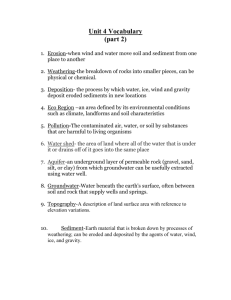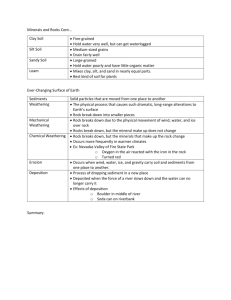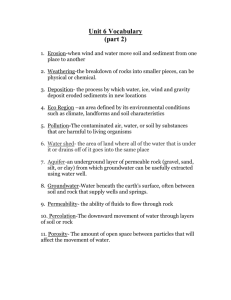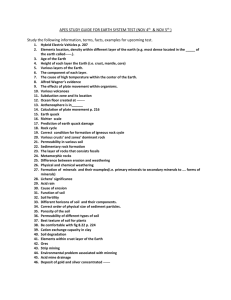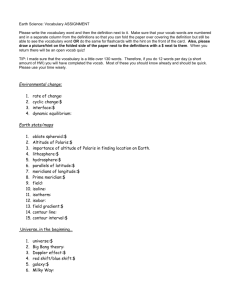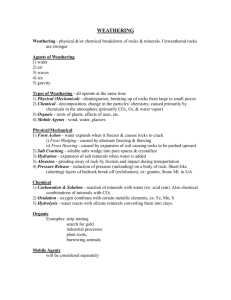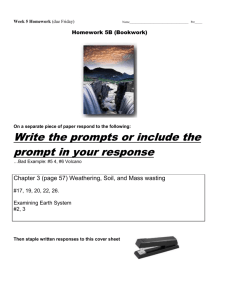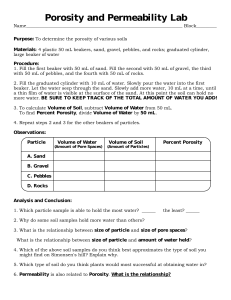Weathering and Soil Science Unit Flashcards
advertisement
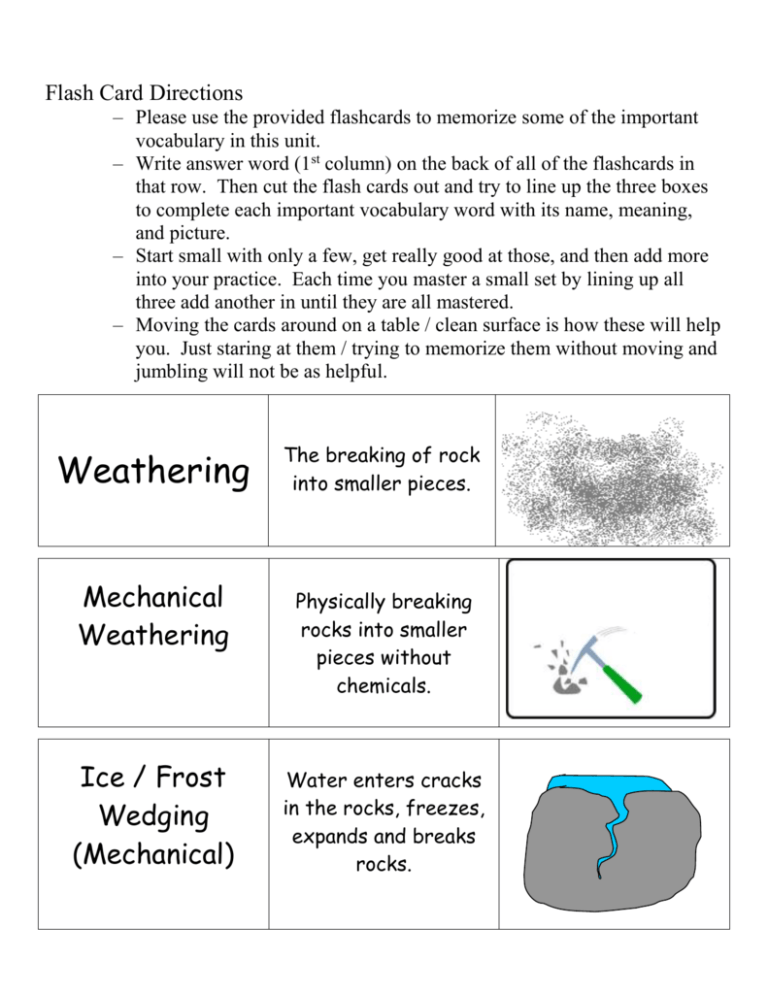
Flash Card Directions – Please use the provided flashcards to memorize some of the important vocabulary in this unit. – Write answer word (1st column) on the back of all of the flashcards in that row. Then cut the flash cards out and try to line up the three boxes to complete each important vocabulary word with its name, meaning, and picture. – Start small with only a few, get really good at those, and then add more into your practice. Each time you master a small set by lining up all three add another in until they are all mastered. – Moving the cards around on a table / clean surface is how these will help you. Just staring at them / trying to memorize them without moving and jumbling will not be as helpful. Weathering Mechanical Weathering Ice / Frost Wedging (Mechanical) The breaking of rock into smaller pieces. Physically breaking rocks into smaller pieces without chemicals. Water enters cracks in the rocks, freezes, expands and breaks rocks. Sheeting / Exfoliation (Mechanical) Layers fall off like an onion. Thermal Expansion (Mechanical) Repeated heating and cooling of rocks will induce stress and breakage. Root / Plant Wedging (Mechanical) Plant roots enter crack, grow and expand the crack Animal Activity (Mechanical) Animals mechanically wear away the rock. HEAT / COOL Wind Weathering (Mechanical) Angle of Repose Particles of sand, pebbles, and dust are carried by wind and cause abrasion and slowly break down rock. The maximum angle of a stable slope determined by friction, cohesion and the shapes of the particles. Chemical Weathering Chemical processes dissolve and decay earth materials. Stalagmite This rises from the floor of a limestone cave due to the dripping of mineralized solutions “Might reach Ceiling” Chemicals Stalactite This hangs from the ceiling of a limestone cave due to the dripping of mineralized solutions Mass Movement Landslide The down slope movement of earthen materials from gravity. “Hang tight” Example -A slide of a large mass of dirt and rock down a mountain or cliff. Soil Creep The slow, steady downhill movement of soil and loose rock. Slump A landslides in which the moving material moves in a block, more or less. Ceiling of cave Soil Black Soil Brown Soil Other Colored Soil A mixture of weathered rock and decaying organic material. Plants, animals, fungus, bacteria… Lots of organic matter (carbon). May be poorly drained. Usually fertile. Lots of sand and clay Well drained Good soil Many compounds present, Iron, Manganese, Sulfur. High in salt. Not as healthy. Boulder Largest Particle Size (Greater than 25 cm) Cobble Particle Size (Between 6-25 cm) Gravel Particle Size (Between 2- 7.5 cm) Sand Particle Size (Just under 2 mm) Silt Particle Size (Below Sand) . Smaller than sand Clay Permeability Very small particle Size (Below Silt) The rate at which water and air move through the soil. Soil Porosity The spaces that allow air and water to move through the soil. Soil Horizon Layers of different types of soil. Erosion Process of wearing or grinding something down. . Deposition Dust Bowl The natural process of laying down a deposit of something. (Sediment) Period of severe dust storms causing major ecological and agricultural damage to American and Canadian prairie Conservation Plowing Disturbing the ground and plant cover as little as possible. Terracing Creating steps against water erosion. Countour Plowing A practice of slowing water run-off by planting across a hills contours. Cover Crop Strip Cropping Alley Cropping Crop Rotation Gully Reclamation A plant that grows first and protects the cash crop. Alternate the type of plant on each row to control water and nutrient uptake. Plant trees in between ground crops. Provides shade, wind break, and prevents water loss. Planting different crops each year. Changes nutrient uptake (increased soil fertility over a long period) Dam gullies to trap silt Plant ground vegetation to stabilize slopes. Wind Breaks Manure Trees at edge of field to break the wind. Add this to plants to increase fertility
